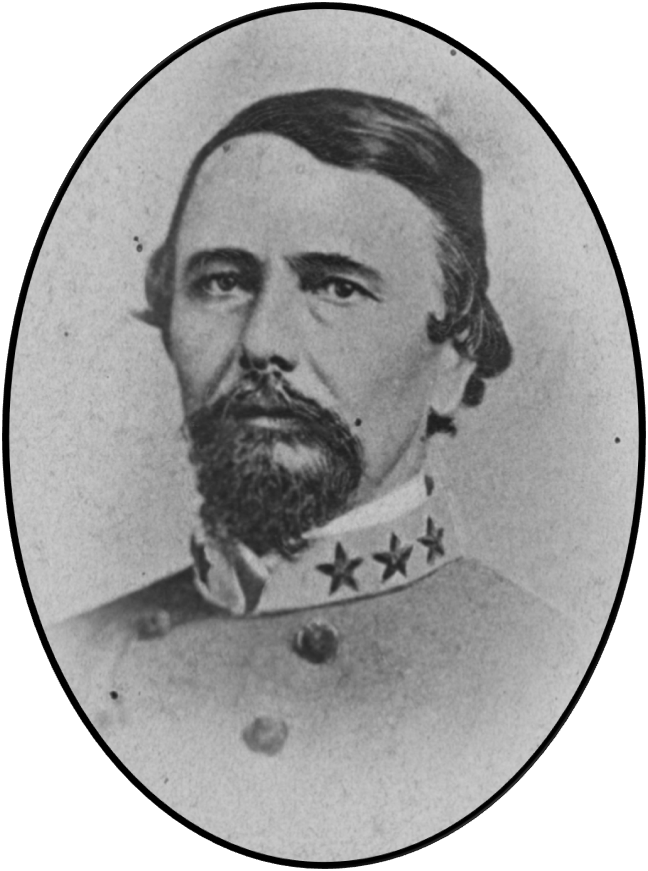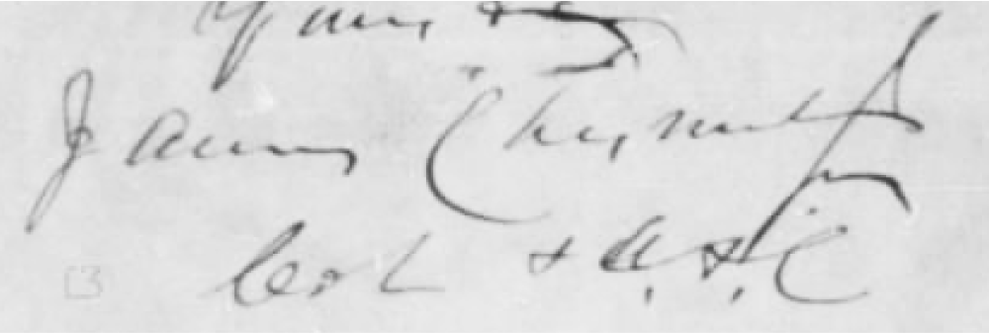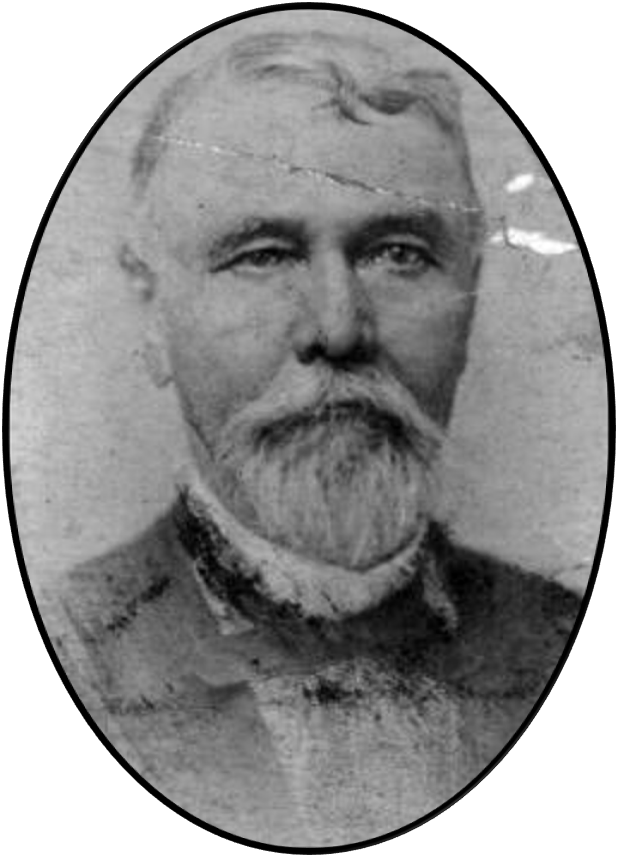James Chesnut Jr.Brigadier General, Provisional Army of the Confederate States
"Genl. Chesnut was a man of high character, beloved by all the community in which he lived. True and faithful always to duty, he has gone to the grave with a clean and white record."'The Abbeville Messenger,' February 4th, 1885.

 (Compiled Service Record) (Compiled Service Record) |
Born: January 18th, 1815, at Camden, Kershaw District, South Carolina, the son of James (1773-1866) and Mary Cox Chesnut
Married: Mary Boykin Miller (1823-1886) on April 23rd, 1840, at Mount Pleasant Plantation near Statesburg, South Carolina.
Pre-War: Attended the College of New Jersey at Princeton, New Jersey, to 1835, when he graduated from the Law Department with honors; studied law under James Louis Petigru and Henry Deas Lesense at Charleston, South Carolina, from 1835 to 1837; admitted to the South Carolina State Bar in 1837; opened a law practice in Camden, South Carolina, in 1838; elected, and served, as a State Representative for Kershaw District in the South Carolina House of Representatives from November 23rd, 1840, to December 15th, 1845, being in the 34th General Assembly from November 23rd, 1840, to December 17th, 1841, in the 35th General Assembly from November 28th, 1842, to December 19th, 1843, and in the 36th General Assembly from November 25th, 1844, to December 15th, 1845, during which time he served as a member of the Committee on Federal Relations from 1840 to 1845, and on the Committee of Education from 1840 to 1843; elected, and served, as a State Representative for Kershaw District in the South Carolina House of Representatives from November 25th, 1850, to December 16th, 1851, being in the 39th General Assembly from November 25th, 1850, to December 16th, 1851, serving on the Committee of Federal Relations from 1850 to 1851; |
served as the delegate of the Third Congressional District of South Carolina at the Nashville Convention in 1850; elected, and served, as a State Senator for Kershaw District in the South Carolina State Senate from November 1st, 1852, to December 3rd, 1858, being in the 40th General Assembly from November 1st, 1852, to December 20th, 1853, in the 41st General Assembly from November 27th, 1854, to December 19th, 1855, in the 42nd General Assembly from November 3rd, 1856, to December 21st, 1857, serving as the President of the State Senate from December 10th, 1856, to December 3rd, 1858, and in the 43rd General Assembly from November 22nd to December 3rd, 1858, during which time he served on the Committee of Agriculture and Internal Improvements from 1852 to 1853, of the Judiciary from 1854 to 1856, and on Federal Relations from 1854 to 1856; served as an elective (1853-1856) and ex officio (1856-1858) Trustee of the South Carolina College in Columbia, South Carolina, from 1853 to 1858; served as a Presidential Elector in 1856; Elected, to fill the unexpired term of Josiah J. Evans, as a Senator from South Carolina in the United States Senate from December 3rd, 1858, to November 10th, 1860, in the 36th Congress; withdrew from the Senate and submitted his resignation from the 36th Congress on November 10th, 1860, however the resignation was rejected and he was expelled from the Senate on July 11th, 1861; member of the Committee to draft the Ordinance of Secession on December 20th, 1860; member of the Secession Convention from Kershaw District from 1860 to 1862.
Service: Served as a volunteer Aide-de-Camp on the staff of Brigadier General P.G.T. Beauregard in the operations around Charleston, South Carolina from January to April 1861; appointed, and served, as the Chief of the Military Department of South Carolina by the State Executive Committee from January to December 1862, when he resigned from the South Carolina Executive Council in 1862, to accept a position on the staff of President Jefferson F. Davis. Served as a Congressman from South Carolina in the Provisional Congress of the Confederate States from February 4th, 1861, to February 17th, 1862, serving on the standing Committees on Naval Affairs & Territories, and of the committee to frame the Confederate Constitution. Appointed as an Aide-de-Camp, with the rank of Colonel of Cavalry, on April 19th, 1862, on the staff of President Jefferson Davis; on a leave of absence in October 1862, during which he is instructed to make an inspection of the enrolling and coast defenses of South Carolina, and make a personal report to the President upon his return; appointed as a Brigadier General in the Provisional Army of the Confederate States, from the State of South Carolina, on April 23rd, 1864, with rank from that date; appointment confirmed by the Confederate Congress on June 9th, 1864; accepted the appointment on April 26th, 1864; commanding the South Carolina Reserve Forces from April 30th, 1864, to April 26th, 1865; surrendered and took the Oath of Allegiance on August 7th, 1865, at Camden, South Carolina, at the time he was described as 50 years of age, of fair complexion, with black hair, blue eyes, was 5 ft. 19. in tall, and was by occupation a planter.
| Post War: Applied for an Executive Pardon on August 7th, 1865, writing to President Andrew Johnson, through Governor Benjamin F. Perry of South Carolina, that "That on the 26th day of April 1865 the date of the Military Convention made between General Johnston and Sherman he held the commission of Brigadier General in the service of the Confederate States. That he is protected now only to the extent of the paroled given under that Convention. That he is willing to abide in good faith, and accepts the results of the recent war. Including the emancipation of slaves and the new relations. Which the State and its citizens must now bear to the Government of the United States. And he therefore asks to be admitted to the benefits intended to be secured by the amnesty proclamation by your Excellency on the 29th day of May 1865." Resumed his law practice in Camden, South Carolina, in 1866; served as a Delegate to the National Democratic Convention in 1867; as a Delegate to the State Democratic Convention in 1870; as a delegate from Kershaw County to the Taxpayers Convention in 1871 and 1874, and as the Chairman of the Executive Committee; as the Chairman of the Kershaw County Democratic Party from 1876; petitioned and had lifted the |
 |
political restrictions upon him to the United States House of Representatives in December 1878.
Died: February 1st, 1885, at 'Sarsfield Plantation' near Camden, Kershaw County, South Carolina
Buried: Knight's Hill Cemetery in Camden, Kershaw County, South Carolina
Notes
Husband of the Diarist Mary Boykin Miller Chesnut (1823-1886)
First Cousin of Brigadier General Zachariah Cantey Deas, P.A.C.S
Resources
"An Address delivered before the Literary Societies of the College of New Jersey, by the Hon. James Chesnut, of South Carolina, on Tuesday, June 27th, 1876." Princeton Press, New Jersey; 1876.
Volume I, "Biographical Directory of the South Carolina House of Representatives." University of South Carolina Press, Columbia, South Carolina; 1974.
Page 298 to 301, Volume I, "Biographical Directory of the South Carolina Senate, 1776-1985." University of South Carolina Press, Columbia, South Carolina; 1986.
"A Diary from Dixie." Mary Boykin Chesnut, Houghton, Mifflin & Company, Boston, Massachusetts, 1949.
Pages 48 & 49, "Generals in Gray. Lives of the Confederate Commanders." Ezra J. Warner, Louisiana State University Press, Baton Rouge, Louisiana; 1997.
"General Officers of the Confederate Army." Marcus J. Wright, The Neale Publishing Company, New York, New York, 1911.
"The Private Mary Chesnut: The Unpublished Civil War Diaries." Mary Boykin Chesnut, Oxford University Press, New York City, New York; 1984.
"Relations of States. Speech of the Hon. James Chesnut Jr. of South Carolina, Delivered in the Senate of the United States, April 9, 1860, on the Resolutions submitted by the Hon. Jefferson Davis, of Miss., on 1st March 1860." John Murphy & Company; Baltimore, Maryland; 1860.
"Report of the Chief of the Department of the Military of South Carolina, to His Excellency, Governor Pickens." Charles P. Pelham, State Printer, Columbia, South Carolina; 1862.
"Chesnut Pardon Application, Case Files of Applications from Former Confederates for Presidential Pardons (Amnesty Papers), 1865-1867. (National Archives Microfilm Publication M1003, 73 Rolls); Records of the Adjutant General's Office, 1780's-1917, Record Group 94; National Archives, Washington, D.C.
|

